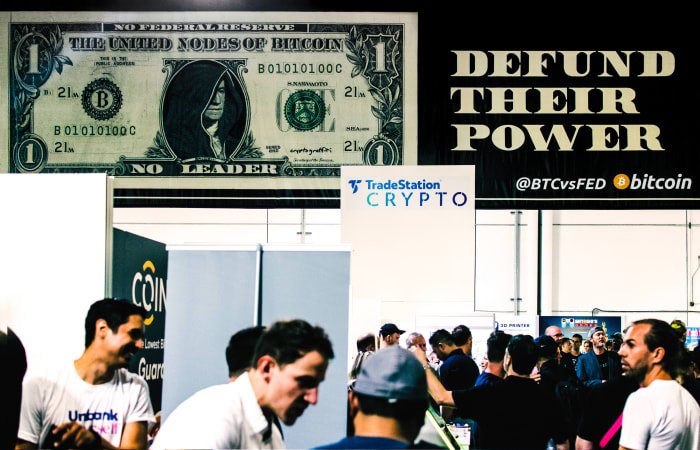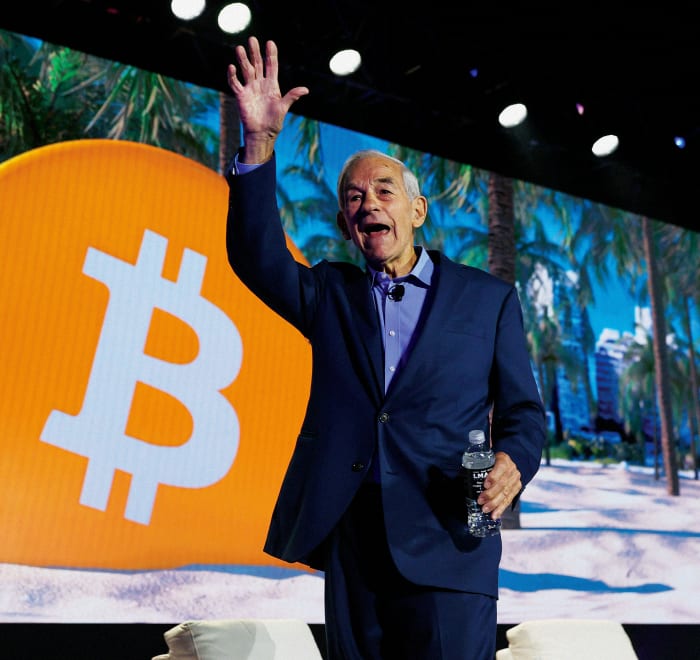How Bitcoin 2021 Redefined In-Person Celebration
This article first appeared in Bitcoin Magazine‘s El Salvador print edition. To get this piece of Bitcoin history sent directly to you, subscribe now.
There’s nothing inherent about Bitcoin that necessitates in-person gatherings. In fact, much of the success of the open-source software project can be attributed to the fact that it’s natively digital, decentralized and accessible by anyone, anywhere in the world with a network connection. Had Satoshi ever revealed their true identity and transcended online message boards to interface with contributors in real life, it’s very possible that Bitcoin could have failed.
And yet, there is a yearning within much of the Bitcoin community to meet up, to share ideas for the project in person, to applaud and boo one another, to celebrate and confirm that, yes, there are other real humans who love this culture and technology.
Since at least August 2011, when about 50 attendees gathered in New York City’s Roosevelt Hotel for what The New York Times called the “world’s first Bitcoin conference,” Bitcoiners have been doing just that. With the bitcoin price at $11, this first event contained much of the energy and enthusiasm that persists in Bitcoin meetups to this day.
“Amateur economists mingled with the software programmers and hardware vendors, who are scrambling to shave off a slice of the nascent economy,” the Times reported of this first recorded conference. “Most people there seemed to be either Bitcoin idealists or Bitcoin profiteers. Some of them were both. The true believers in the group form a kind of ideological brotherhood and they imagine a world where online vendors make direct financial contact with their customers. No need for credit cards, banks, PayPal, and their inevitable additional costs. No more turning over sensitive private information with every purchase — although account histories are public, account owners are quasi-anonymous. Many Bitcoin enthusiasts also dream of replacing the machinations of the Federal Reserve with an inherently predictable network, one that could never print new money.”
Those dreams of what Bitcoin can and should become were still very much alive at Bitcoin 2021. And while much remains the same about why Bitcoiners are drawn to gather in person, this event was ultimately like none other before. In many ways, it demonstrated how much progress has been made by Bitcoin and its community in realizing the goals that have always been central to this project.
“As If Twitter Had Come To Life”

Art encouraging attendees to defund the Federal Reserve by opting into Bitcoin adorned the halls of Bitcoin 2021.
“As the sky turned pink and then black, Bitcoin 2021 splintered into cocktail hours, rooftop dinners, boat parties and clubs. I witnessed colleagues who had worked together via Slack and Zoom for a year meet one another in person for the first time, hugging … After a year of isolation, it felt as if Twitter had come to life. But we were all there together, and the view was nice.”
–Erin Griffith, The New York Times, June 5, 2021.
For BTC Inc, the organizer of the Bitcoin Event Series and parent company of Bitcoin Magazine (and employer of this author), there is little question that the natively digital Bitcoin project requires in-person events. In fact, in the view of the company, Bitcoin has still not yet seen a live event on the scale that its community demands.
BTC Inc launched its event series with Bitcoin 2019, gathering roughly 2,000 attendees in San Francisco at a 100,000-square-foot venue in June of that year. Edward Snowden spoke about freedom from surveillance via satellite, attendees bought beers and played arcade games using the Lightning Network, and hundreds of devs participated in an accompanying hackathon. It emphasized the fact that Bitcoin is a movement, a cultural phenomenon that is more than the sum of its parts (technical, financial, anarchical or any other). It laid the groundwork for a larger iteration in 2020, but then COVID-19 happened.
The successor to Bitcoin 2019 was originally scheduled to take place in San Francisco from March 27 to 28, 2020. As the spread of COVID-19 prompted social distancing mandates and forced live events to cancel, postpone or pivot to virtual attendance, BTC Inc moved the event to the third quarter of the year. When it then became clear that California would be one of the country’s least-hospitable states for live events, the BTC Inc team found a new home for the largest Bitcoin gathering in history in Miami, rescheduling the event for June 4 to 5, 2021.
Bitcoin 2021 promptly sold out, bringing more than 12,000 attendees to a six-acre campus in Miami’s vibrant Wynwood neighborhood. There were many there who would have fit in at the 2011 Bitcoin event, and many others who knew only that they liked Bitcoin. The majority of those attending were white and male, but anecdotal observation indicated that the diversity of such events was increasing, aided in part by Bitcoin 2021’s free, festival atmosphere.
“The crowd look was mixed,” reported CNBC. “Picture conference merch like neon-colored fanny packs, Bitcoin 2021 branded sunglasses, and t-shirts with crypto puns and hashtags. Some appeared ready for a summer rave.”
The speaker lineup included Twitter and Square CEO Jack Dorsey, professional skateboarder Tony Hawk, U.S. Senator Cynthia Lummis, MicroStrategy CEO Michael Saylor, cryptography pioneer Nick Szabo, former U.S. Congressman Ron Paul and dozens of others. There were DJs, bars, food trucks, a basketball court, a dumpster full of hyperinflated fiat bills as well as actual trash, sumo wrestling demonstrations, a gaming stage, an art gallery and a half-pipe.
The underlying motivation of the event — to eliminate financial service middlemen and replace central banks — was the same as Bitcoin’s first conference, but Bitcoin 2021 proved that BTC is a cultural force to be reckoned with, not just a niche technical phenomenon. Particularly after a year of forced quarantine, it was clear that Bitcoiners do not want to exclusively interact with each other and their favorite technology through the computer. They want to celebrate.
“Well, What’s To Confer About?”

MicroStrategy CEO Michael Saylor and “Orange Pill” ringmaster Max Keiser took the stage for a keynote.
“‘Well, what’s to confer about?’ The cop asks. He raises one skeptical brow. ‘I mean, you either have bitcoin or you don’t. Right?’ As it turns out, Bitcoin provides a seemingly endless supply of material over which to confer, and a far-flung group of attendees eager to confer upon it.”
–Zoë Bernard, Rolling Stone, July 13, 2021.
In the two years that passed between Bitcoin 2019 and Bitcoin 2021, it was clear to Bitcoiners at least that there was much to confer upon. The Bitcoin protocol was seeing a new form of soft fork take place as miners signaled their support for the Taproot upgrade. Saylor’s MicroStrategy software intelligence firm had embarked on the most aggressive speculative attack on the dollar ever seen. The bitcoin price had hit an all-time high of more than $64,000.
There were company announcements and platform demonstrations, high-profile Bitcoiners shared their perspectives and any number of satellite events continued the wide-ranging attendee conversations after hours.
“For me, Bitcoin changes absolutely everything,” Dorsey said during his fireside chat at the event, before he was heckled by political activist Laura Loomer over what she perceives as censorship of speech on Twitter. “What I’m drawn to the most about it is the ethos, what it represents … Whatever I can do, whatever my companies can do to make [Bitcoin] accessible to everyone, that is what I will do for the rest of my life.”
Later, a recorded message for Bitcoiners from Silk Road Founder Ross Ulbricht, who was speaking publicly for the first time since his 2013 arrest, was played for attendees.
“I’ve spent the last eight years watching Bitcoin grow up from in here,” Ulbricht said from a maximum security federal prison in Arizona. “I’ve seen incredible innovation. I’ve seen inspiring courage. We didn’t know how things would turn out for Bitcoin back in the beginning, but over the years, I’ve been continually impressed with what you’ve accomplished … We are transforming the global economy. We have brought a taste of freedom and equality to far corners of the world.”
And, in the most favorable legislative announcement in Bitcoin history, President Nayib Bukele of El Salvador declared in a video message played exclusively to the Bitcoin 2021 audience that his country would recognize bitcoin as legal tender.
“Over 70% of the active population of El Salvador doesn’t have a bank account. They’re not in the financial system,” said Jack Mallers, CEO of Lightning Network platform Strike, as he set the stage for Bukele’s announcement. “[The government of El Salvador] asked me to help write a plan and that they viewed bitcoin as a world-class currency and that we needed to put together a Bitcoin plan to help these people.”
Mallers’ presentation brought many audience members to tears. As the beginning of Bukele’s video statement played, the president announced: “Next week, I will send to congress a bill that will make bitcoin a legal tender.”
The audience burst into a standing ovation. The remainder of the president’s video message was drowned out. In that groundbreaking moment, nothing else seemed to matter.
“Wait ’Til They Figure Out How Far We’re Willing To Go To Support The Cause”
“Journalists and nocoiners gleefully dunking on a few folks getting COVID during a huge Bitcoin conference. Nobody mentioning that Bitcoiners are willing to risk their lives to attend a conference. Wait ’til they figure out how far we’re willing to go to support the cause.”
–Jameson Lopp, Twitter, June 11, 2021.
Bitcoin 2021 received a lot of mainstream attention for a number of reasons, not least because it was the largest real-life gathering of the Bitcoin community in history, at a time when Bitcoin was beginning to gain more mainstream news attention in general.
But it was also notable as one of the first major in-person gatherings as the initial COVID-19 lockdowns were eased. The Bitcoin community draws many people who are anti-restriction and distrustful of authority, and it seemed fitting that this event offered a relief from mandated quarantine. The timing also offered a chance for the Bitcoin community to demonstrate why gathering together in real life is an imperative for their support of this software project.
“This might sound over the top, but it’s like, ‘When the American Revolution started, yellow fever abounded. And we didn’t cancel the American Revolution over a little yellow fever,’” David Bailey, CEO of BTC Inc, told Rolling Stone when asked about hosting one of the largest gatherings in the U.S. since the beginning of the pandemic. “So we just set the tone that if you come to this conference, you might die. And that’s that.”
A sold-out crowd did come to the conference, despite (or maybe because of) that tone. They felt it necessary to gather in person and celebrate a revolutionary technology, one whose underlying dream has always been of eliminating credit cards and replacing the machinations of the Federal Reserve. In many cases, they traveled from places that would not host such a gathering due to potential health risks to go somewhere that would.
Across dozens of on-stage presentations, hundreds of activations, thousands of toasts and countless in-person connections, they proved that in-person Bitcoin gatherings are much needed. Not to keep the network running but to keep its community vibrant.
As of this writing, the event series is scheduled to proceed with Bitcoin 2022 from April 6 to April 9, 2022, at the Miami Beach Convention Center, expecting 35,000 attendees. There’s no way to know what Bitcoiners will be celebrating by then. But the point is, they’ll be celebrating together.





